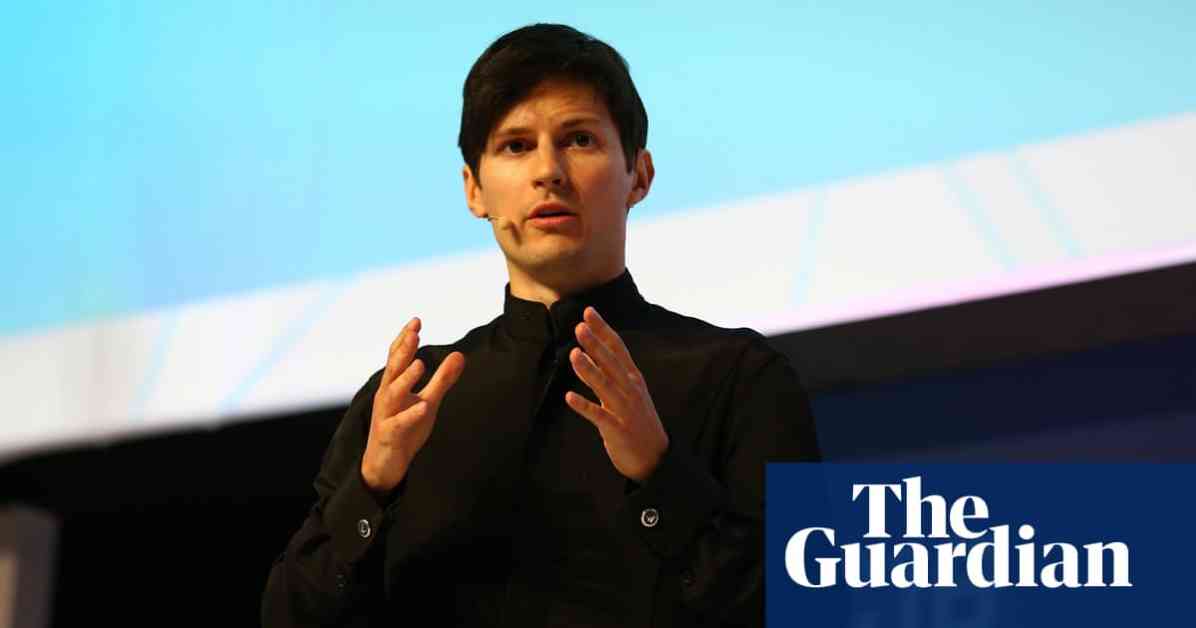Telegram CEO Pavel Durov Faces Charges in France for Allowing Criminal Activity on Messaging App
The CEO of Telegram, Pavel Durov, has found himself in hot water with the French judiciary over allegations of allowing criminal activity to flourish on the messaging app. Despite facing serious charges, Durov managed to avoid jail time by posting a hefty €5 million bail. This Russian-born multi-billionaire, who also holds French citizenship, was released on the condition that he report to a police station twice a week and remain in France, as confirmed by Paris prosecutor Laure Beccuau.
The charges levied against Durov include accusations of complicity in the dissemination of sexual images of children and a range of other violations on the messaging platform. Durov’s detention occurred at Le Bourget airport, located just outside Paris, on suspicion of failing to take action against illicit content on Telegram, such as the exchange of child sexual imagery, drug trafficking, and fraud. This sudden arrest has shed light on the legal responsibility of Telegram, a widely used app with approximately 1 billion users, sparking discussions on free speech and government censorship.
The Legal Battle:
Specialist French cybercrime and fraud investigators revealed that Durov’s arrest was part of a broader investigation into the platform’s alleged failure to moderate criminal activities. In response to the accusations, Telegram released a statement asserting its compliance with European Union laws and highlighting its moderation practices as being “within industry standards and constantly improving.” The statement also defended Durov, claiming that he had nothing to hide and frequently traveled throughout Europe. Telegram dismissed the notion that the platform or its owner could be held responsible for the misuse of the platform, labeling such claims as absurd.
Durov, often hailed as “Russia’s Mark Zuckerberg,” currently resides in Dubai, where Telegram is headquartered, and holds citizenship in France and the United Arab Emirates. He previously attempted to settle in various cities such as Berlin, London, Singapore, and San Francisco before choosing Dubai, citing the city’s favorable business environment and “neutrality.”
Telegram’s Scrutiny:
Telegram has long been under the radar of law enforcement agencies globally due to its alleged use by terrorist organizations, drug traffickers, arms dealers, and far-right extremist groups for communication, recruitment, and coordination. In an interview with the Financial Times earlier this year, Durov emphasized that child abuse material and public calls for violence were “red lines” for Telegram. Despite this stance, he has consistently championed the platform’s minimal moderation policies and commitment to free speech, boasting of employing only 30 full-time engineers at his company.
Unlike other tech moguls like Elon Musk and Mark Zuckerberg, Durov has managed to evade much of the public scrutiny typically faced by top executives. He maintains a low-profile, rarely granting interviews and instead opting to showcase his simplistic lifestyle on social media, where he occasionally shares personal details such as being a sperm donor with over 100 biological children. Durov’s departure from Russia in 2014 came after he refused Kremlin demands to shut down opposition groups on VK, a social network he founded at the age of 22. Following a dispute with VK’s Kremlin-linked owners, Durov shifted his focus to Telegram, which he co-founded with his brother Nikolai in 2013.
The Political Element:
The timing and circumstances surrounding Durov’s detention have raised questions, particularly regarding his purported ties to the Kremlin. Leaked border data revealed that Durov had visited Russia over 50 times between 2015 and 2021, sparking speculations about his ongoing connections to the Russian government. Russian officials have alleged that Durov’s arrest is politically motivated, a claim vehemently denied by French President Emmanuel Macron.
Reports from Le Monde and The Wall Street Journal have shed light on Durov’s interactions with President Macron, including multiple meetings before Durov obtained French nationality in 2021 through a special procedure reserved for individuals deemed to have made significant contributions to France. Macron reportedly suggested in 2018 that Durov relocate Telegram’s headquarters to Paris, an offer that Durov reportedly declined.
In conclusion, Pavel Durov’s legal troubles in France have opened a Pandora’s box of complex issues involving online platforms, criminal activity, and governmental oversight. As the CEO of Telegram navigates these turbulent waters, the case serves as a poignant reminder of the intricate interplay between technology, regulation, and individual rights.












